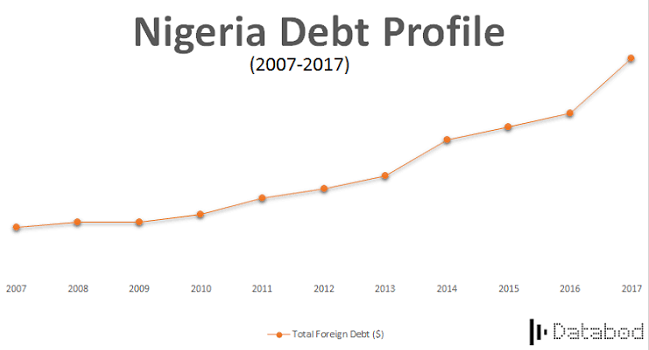Business
Senators insist Nigeria’s debt profile alarming

Some members of the upper chamber of the National Assembly, on Wednesday, described the debt profile of the country as alarming.
The senators, Ike Ekweremadu, Dino Melaye and Shehu Sani stated this in their contributions to the discussions on the general principles of the 2019 budget, adding that the rising debt profile is unhealthy for the nation’s economy.
It would be recalled that the Debt Management Office, in its official website published that the nation’s foreign and domestic debt stock as of September 30 2018, stood at N22.428trn.
The Deputy Senate President, Ike Ekweremadu, in his contribution, noted that borrowing was becoming increasingly unsustainable and urged the nation’s leaders to caution themselves before they mortgage the future of their children.
He said: “Some countries are already in danger including Indonesia because of the borrowing they had in the past. For every money we borrow, there must be a day for payment.
“We must therefore be cautious. Yes, it is important that we address our infrastructural needs through appropriate financing but I believe there are other creative ways of funding infrastructure, including Public Private Partnership and concessioning.
“It is time for us to ensure that our debt to GDP ratio must not exceed an acceptable level.”
Senator Melaye, who represents Kogi West, also decried the debt profile of the country, stressing that the nation had borrowed over $40bn in the last four years to stabilise the naira.
He said: “Nigerian government and the parliament should be sorry about the 2019 budget. The Federal Government has spent $41bn to cushion, maintain and stabilise the naira. We no longer have enough foreign reserve to continue to cushion the effects of the devaluation of the naira.
“The price of crude has dropped to $50 from $60. This is very significant and has made the price of crude oil in the 2019 budget unrealistic and unrealisable. There is a drop in the internally generated revenue of the Federal Government.
“There is a drop in the revenue of the Nigeria Customs Service. Federal Government has no money again to subsidise fuel subsidy. In the midst of this entire calamitous situation, how do we fund the 2019 budget?
“Are we going to fund it based on daily contributions? Are we going to borrow again? These are questions begging for answers. I want to announce to Nigerians that the Federal Government will soon deregulate.
“Inflation is rising. Unemployment is on the increase, yet we have a budget that made no provision for the poor masses of this country.
“I challenge the proponent of the 2019 budget and those who support anything presented by the executive to tell me where in the 2019 budget that any provision has been made for the poor, and the unemployed.
“There is no longer foreign investment in Nigeria. With all these indices and yardsticks, by the end of May, except there is a miracle, a dollar will rise to N500.
Read also: ELECTRICITY: Fashola retracts, promises to provide details of corrupt contractors
“Our foreign reserve has been depleted. We are a borrowing nation. Upon the announcement of Muhammadu Buhari as the winner of the election, the stock market has lost over N300bn.
“There will be devaluation of the naira. We cannot as a nation be borrowing again to fund the 2019 budget. Our external debt as we speak today stands at $23bn, which is the highest in the history of the Federal Republic of Nigeria, not even under the military government did we have this type of borrowing.
“Our local debt today is over $20bn, hence the nation owes over $40bn with the 60 per cent incurred under the Buhari administration.
“Already, there is a plan by the executive to write the senate to demand approval for another $12bn to service the Port Harcourt-Maiduguri rail project. This will take our borrowings to over $60bn”
Senator Shehu Sani, who Chairs Senate Committee on Local and Foreign Debts, described the nation’s debt profile as alarming, adding that there is need for proper audit of funds allocated to the military and the social investment programme of the Federal Government.
He said: “Funding for the military should be well audited and targeted specifically on areas of need. The budgetary allocation to education is grossly inadequate for the sector.
“Social investment fund should be properly audited. There should be deliberate and realistic means of empowering the youths and creating employment. There is a need to withdraw the military from civil service to enable them to concentrate on the protection of the nation’s territorial integrity.”
Join the conversation
Support Ripples Nigeria, hold up solutions journalism
Balanced, fearless journalism driven by data comes at huge financial costs.
As a media platform, we hold leadership accountable and will not trade the right to press freedom and free speech for a piece of cake.
If you like what we do, and are ready to uphold solutions journalism, kindly donate to the Ripples Nigeria cause.
Your support would help to ensure that citizens and institutions continue to have free access to credible and reliable information for societal development.
























